[重要] garden path 例句
花园的英文怎么读

花园的英文怎么读花园汉语词语,是指种植花木供游玩休息的场所,旧时原用于命名园林建筑,现在花园多用于称谓开放性的公园或别墅的私人花园。
那么你知道花园的英文怎么读吗?一起来学习一下吧!花园的英文:garden英 [ˈgɑ:dn]美 [ˈgɑ:rdn]词组习语:everything in the garden is rosy1. (英)事事如意the garden of England1. 英格兰花园(英国土地肥沃地区,尤指肯特郡或伊夫舍姆谷)lead down the garden path 或 take down the garden path1. 误导或欺骗(另一个人)花园的英文例句:1. I wanted the front garden to be a blaze of colour.我想让门前的花园变得五彩缤纷。
2. He tramped hurriedly round the lake towards the garden.他匆匆地迈着沉重的步伐绕过湖边向花园走去。
3. He reached the garden gate and thrust his way through it.他来到花园门口,挤了进去。
4. I sat in the garden and watched the passing cars.我坐在花园里,看着过往车辆。
5. It was 1956 when Susanna started the work on the garden.苏珊娜是从1956年开始修建这个花园的。
6. Mummy says I can play out in the garden.妈妈说我可以到外面花园里玩。
7. I'll do your garden, I'll keep that tidy for you.我会帮你弄弄花园,帮你保持它的整洁。
8. Marilyn made her last public appearance at Madison Square Garden.玛丽莲最后一次公开亮相是在麦迪逊广场花园。
语言学的名词解释
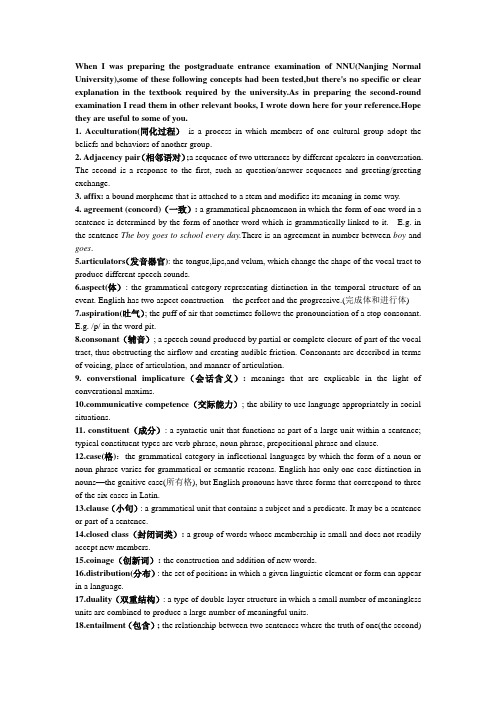
When I was preparing the postgraduate entrance examination of NNU(Nanjing Normal University),some of these following concepts had been tested,but there's no specific or clear explanation in the textbook required by the university.As in preparing the second-round examination I read them in other relevant books, I wrote down here for your reference.Hope they are useful to some of you.1. Acculturation(同化过程)is a process in which members of one cultural group adopt the beliefs and behaviors of another group.2. Adjacency pair(相邻语对);a sequence of two utterances by different speakers in conversation. The second is a response to the first, such as question/answer sequences and greeting/greeting exchange.3. affix: a bound morpheme that is attached to a stem and modifies its meaning in some way.4. agreement (concord)(一致): a grammatical phenomenon in which the form of one word in a sentence is determined by the form of another word which is grammatically linked to it. E.g. in the sentence The boy goes to school every day.There is an agreement in number between boy and goes.5.articulators(发音器官): the tongue,lips,and velum, which change the shape of the vocal tract to produce different speech sounds.6.aspect(体): the grammatical category representing distinction in the temporal structure of an event. English has two aspect construction---the perfect and the progressive.(完成体和进行体)7.aspiration(吐气); the puff of air that sometimes follows the pronounciation of a stop consonant.E.g. /p/ in the word pit.8.consonant(辅音); a speech sound produced by partial or complete closure of part of the vocal tract, thus obstructing the airflow and creating audible friction. Consonants are described in terms of voicing, place of articulation, and manner of articulation.9. converstional implicature(会话含义):meanings that are explicable in the light of converational maxims.municative competence(交际能力); the ability to use language appropriately in social situations.11. constituent(成分): a syntactic unit that functions as part of a large unit within a sentence; typical constituent types are verb phrase, noun phrase, prepositional phrase and clause.12.case(格):the grammatical category in inflectional languages by which the form of a noun or noun phrase varies for grammatical or semantic reasons. English has only one case distinction in nouns—the genitive case(所有格), but English pronouns have three forms that correspond to three of the six cases in Latin.13.clause(小句): a grammatical unit that contains a subject and a predicate. It may be a sentence or part of a sentence.14.closed class(封闭词类): a group of words whose membership is small and does not readily accept new members.15.coinage(创新词): the construction and addition of new words.16.distribution(分布): the set of positions in which a given linguistic element or form can appear in a language.17.duality(双重结构): a type of double-layer structure in which a small number of meaningless units are combined to produce a large number of meaningful units.18.entailment(包含); the relationship between two sentences where the truth of one(the second)is inferred from the truth of the other.19.euphemism(委婉语): a word or phrase that replaces a taboo word or is used to avoid reference to certain acts or subjects,e.g. powder room for toilet.20.garden path sentence(花园小径句): a sentence in which the comprehender assumes a particular meaning of a word or a phrase but later discovers that the assumption was incorrect, forcing the comprehender to backtrack and reinterpret the sentence21.free variation;(自由变异) a relation between two speech sounds such that either one can occur in a certain position and the substitution of one for the other never makes any difference in the meaning of the word. For instance, the unexploded(失去爆破) stop /d/ in the phrase Good morning is in free varitation with the exploded(爆破)counterpart.22.inflection(屈折变化): the morphological process by which affixes combine with words or stems to indicate such grammatical categories as tense or plurity.ernment(支配): the grammatical phonomenon in which the presence of a particular word in a sentence requires a second word which is grammatical linked with it to appear in a particular form. E.g. a preposition or a verb requires that the pronoun following it be in the objective form,as in with me,to him.nguage universal(语言共性): any property that is shared by most,if not all, human lanugages.25.lingua franca: ( 通用语) A language variety used for communication among groups of people wo do not otherwise share a common language. For example, English is the lingua franca of the international scientific community.26.macrosociolinguistics; The study of the effect of language on society.27.microsociolinguistics: The study of the effect of any and all aspects of society,including cultural norms, expetations and contexts,on the way language is used. It is often simply called sociolinguistics.28.paradigmatic relation: (纵组合关系)The substitutional relation between a set of linguistic items,that is,linguistic forms(letters,words and phrases)can be substituted for each other in the same position in a word or sentence. E.g, b,p,s,f are in paradigmatic relation in the words bit,pit,sit,fit, so are Nature,Beauty, Love, Honesty in the sentences:Nature purifies the mind.Beauty purifies the mind.Love purifies the mind.Honesty purifies the mind.29.syntagmatic relation: (横组合关系) The relation between any linguistic elements which are simultaneously present in a structure. E.g. in the word bit, b, i,t are in syntagmatic relation, so are nature, purifies, the, mind, in the sentence Nature purifies the mind.30.presupposition(预设): implicit assumptions about the world acquired to make an utterance meaningful or appropriate,e,g, “ some tea has already been taken”is a presuppostion of “Take some more tea”.31.prototype(典型): What members of a particular community think of as the best example of a lexical category,e.g.for some English spe akers “cabbage”(rather than,say,carrot)might be the prototypical vegetable.32.root(词根): the morpheme that remains when all affixes are stripped from a complex word. E.g. system from un- + system + atic + ally.33.stem(词干): the base to which one or more affixes are attached to create a more complex form that may be another stem or a word.34.taboo(禁忌语):words that are offensive or embarrassing, considered inappropriate for “polite society”, thus to be avoided in conversation.35.selectional restriction(选择限制): a restriction on the combining of words in a sentence resulting from their meaning.36.linguistic universal:(语言共性) The linguistic universals are principles that enable children to acquire a particular language unconsciously, without instruction in the early years of life. As a whole they are referred to as Universal Grammar.37.contrastive distribution(对比分布):If the speech sounds occur in the same phonetic context and the substitution results a contrast in meaning, we say they are in contrastive distribution.38.immidiate constituent analysis(直接成分分析法)is the technique of breaking up sentences into word groups by making successive binary cuttings until the level of single words is reached.39.endocentric construction: (向心结构或内心结构)One construction whose distribution is functionally equivalent, or approaching equivalence, to one of its constituents. The typical English endocentric constructions are noun phrases and adjective phrases.40.exocentric construction(离心结构或外心结构)the opposite of endocentric construction,refers to a group of syntactically related words where none of the words is functionally equivalent to the whole group. Most constructions are exocentric.41.politeness can be defined as the means employed to show awareness of another person’s public self-image.42.PP(politeness principle)tact maxim;generosity principle;approbation maxim;modesty maxim;agreement maxim;sympathy maxim.43.irony(反语)is the use of words to express something other than and especially the opposite of the literal meaning of the utterance.44.code-switching: (语码转换) means the alternation between two or more languages,language varieties or registers in communication.45.affective filter(情感过滤):A screen of emotion that can block language acquisition or learning if it keeps the learners being too self-conscious or too embarrassed to take risks during communicative exchanges.46.Conversion(转类构词)is a change in the grammatical function of a word without adding or removing any part of it. A word belonging to one part of speech is extended to another part of speech. It is also called functional shift or zero derivation.47.lexical meaning VS grammatical meaning(词汇意义与语法意义)The meaning of a sentence is carried by the words proper as well as by the patterns of word order that is part of the grammatical system of a language. The part of the sentence meaning contributed by words is called the lexical meaning and the part of sentence meaning that depends upon the way the words are put together is called grammatical meaning, in which the function words and the word order play a very important role.48.paralinguistic meaning VS non-linguistic meaning (副语言意义与非语言意义)In human communication, apart from the linguistic meaning conveyed by language itself,there are numerous paralinguistic meanings and non-linguistic meanings that are perceived simultaneously by the hearer. Paralinguistic meanings are those attached to the verbal expressions by quality of voice,tempo of speech,posture,facial expression and gestures. Non-linguistic meanings are thoseindicated by non-verbal noises such as cough, sigh, tongue-clicking, various kinds of body languages and different contexts of situation.49.denotation VS connotation (外延与内涵)Denotation is a straightforward, literal meaning of the word every member of the language speaking community will agree on. Connotation is not the basic meaing of the word but some emotive or evaluative meaings associated with the word by individual language users in their mind.50.linguistic relativity VS linguistic determinism (语言相对论与语言决定论)The Sapir-Wholf Hypothesis states that there is a systematic relationship between the grammatical categories of the language a person speaks and how that person both understands the world and behaves in it. It boils down to two principles: linguistic relativity and linguistic determinism.Linguistic relativity states that disctinctions encoded in one language are unique to that langage alone, and that there is no limit to the structural diversity of languages.Linguistic determinism refers to the idea that the language we use determines, to some extent, the way in which we view and think about the world around us. This concept has two versions; strongdeterminism and weak determinism. The strong version, which has few followers today, holds that language actually determines thought, whereas that weak version, which is widely accepted today, merely holds that language affects thought.。
从句法语义角度阐释“花园小径现象”形成原因
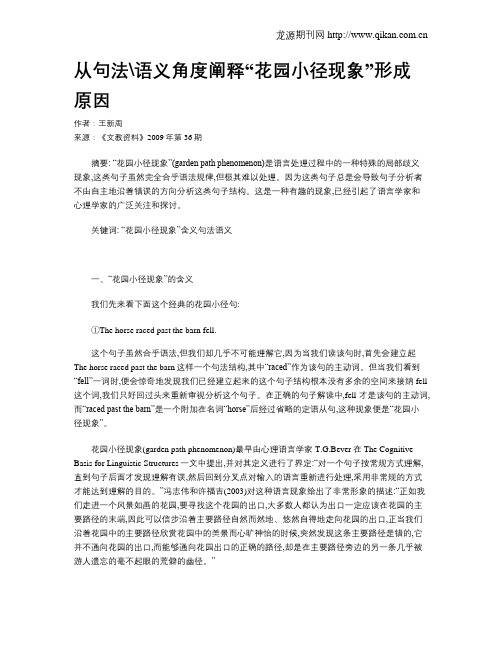
从句法\语义角度阐释“花园小径现象”形成原因作者:王新周来源:《文教资料》2009年第36期摘要: “花园小径现象”(garden path phenomenon)是语言处理过程中的一种特殊的局部歧义现象,这类句子虽然完全合乎语法规律,但极其难以处理。
因为这类句子总是会导致句子分析者不由自主地沿着错误的方向分析这类句子结构。
这是一种有趣的现象,已经引起了语言学家和心理学家的广泛关注和探讨。
关键词: “花园小径现象”含义句法语义一、“花园小径现象”的含义我们先来看下面这个经典的花园小径句:①The horse raced past the barn fell.这个句子虽然合乎语法,但我们却几乎不可能理解它,因为当我们读该句时,首先会建立起The horse raced past the barn这样一个句法结构,其中“raced”作为该句的主动词。
但当我们看到“fell”一词时,便会惊奇地发现我们已经建立起来的这个句子结构根本没有多余的空间来接纳fell 这个词,我们只好回过头来重新审视分析这个句子。
在正确的句子解读中,fell才是该句的主动词,而“raced past the barn”是一个附加在名词“horse”后经过省略的定语从句,这种现象便是“花园小径现象”。
花园小径现象(garden path phenomenon)最早由心理语言学家T.G.Bever在The Cognitive Basis for Linguistic Structures一文中提出,并对其定义进行了界定:“对一个句子按常规方式理解,直到句子后面才发现理解有误,然后回到分叉点对输入的语言重新进行处理,采用非常规的方式才能达到理解的目的。
”冯志伟和许福吉(2003)对这种语言现象给出了非常形象的描述:“正如我们走进一个风景如画的花园,要寻找这个花园的出口,大多数人都认为出口一定应该在花园的主要路径的末端,因此可以信步沿着主要路径自然而然地、悠然自得地走向花园的出口,正当我们沿着花园中的主要路径欣赏花园中的美景而心旷神怡的时候,突然发现这条主要路径是错的,它并不通向花园的出口,而能够通向花园出口的正确的路径,却是在主要路径旁边的另一条几乎被游人遗忘的毫不起眼的荒僻的幽径。
花园小径
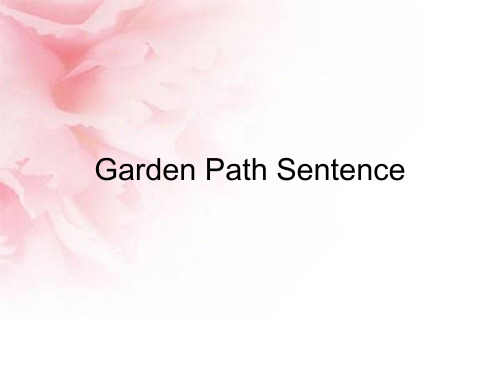
Conclusion
花园路径句是一种复杂的语言现象,引 起了心理语言学家、句法学家、认知语用 学家的关注,他们都对这种现象做出了不同 的解释,帮助我们了解人类语言的内在规律, 对语言学习和语言理解产生了深远的影响。 但是现在的研究缺乏定量和定性研究相结 合,许多深层问题还有待于通过实证的方法 来解决。
•
New Trend : the ultimate representation of reanalysis of garden path sentences.
• Basing on the experiment data on native English speakers, some scholars (Ferreira, 2003; Christianson, 2001) found evidence that under some conditions, even after reanalysis took place, parsers failed to produce accurate interpretations consistent.
• In China:
蒋祖康对花园路径句现象进行了部分的综述。 徐章宏、黄碧蓉等从关联理论的角度研究了花园路径句 的认知过程。 冯志伟、许福吉,韩玉花研究了汉语中的“花园路径现 象” 晏小琴通过有声思维和回顾访谈的形式探讨了在不限时 的自然状态下加工三种不同类型的花园路径句过程中所 遭遇的困难、歧义句解歧程度和重新分析的难易度问题。 吴红岩探讨了利用优选句法理论来解释花园路径句。 刘国辉、石锡书从特殊思维激活图式理论来阐 释这一语言现象。
The syntactic features
• First, garden path sentences were temporarily ambiguous. • Second, parsers had uneven preferences for the possible interpretations of the ambiguous region. • However, it was always the interpretation that they were most reluctant to accept that turned out to be the only one consistent with the true content of the sentence.
garden path sentence语言学

garden path sentence语言学摘要:一、花园小径句子的概念1.定义与来源2.语言学上的特点二、花园小径句子的结构与分类1.结构特点2.分类三、花园小径句子的功能与应用1.功能2.应用领域四、花园小径句子在语言学中的研究意义1.对语言学理论的贡献2.对自然语言处理技术的促进五、未来研究方向与挑战1.深入挖掘花园小径句子的潜力2.应对处理花园小径句子的挑战正文:花园小径句子(garden path sentence)是语言学中的一个重要概念,指的是在语义理解过程中,由于句子结构的复杂性,导致读者在阅读过程中产生歧义,进而走向错误的语义理解路径,最后又折返回正确的理解路径的句子。
这种现象形象地被称为“花园小径”,意味着读者在语言的迷宫中探索,最后回到正确的理解道路上。
花园小径句子的结构特点主要体现在句子内部的层次结构和信息排列上。
这类句子通常包含一个主要信息和一个或多个误导信息,这些误导信息可能会干扰读者的理解过程。
在花园小径句子的结构中,主要信息和误导信息之间的关系错综复杂,使得读者在阅读过程中容易产生歧义。
花园小径句子可以根据结构特点和语义特点进行分类。
根据结构特点,花园小径句子可以分为并列型、从属型和修饰型等;根据语义特点,可以分为顺向型、逆向型和多路径型等。
不同类型的花园小径句子在实际应用中具有不同的特点和功能。
花园小径句子在实际应用中具有广泛的功能,如在文学作品中,作者利用花园小径句子来制造悬念、增强表达效果;在广告、营销等领域,花园小径句子被用来吸引受众注意力,提高信息传播效果。
此外,花园小径句子在语言学研究和自然语言处理技术中也具有重要意义。
通过对花园小径句子的研究,可以揭示人类语言理解的内在机制,为自然语言处理技术的发展提供理论支持。
然而,花园小径句子在处理过程中也面临诸多挑战,如识别准确率低、处理速度慢等。
garden path sentence语言学
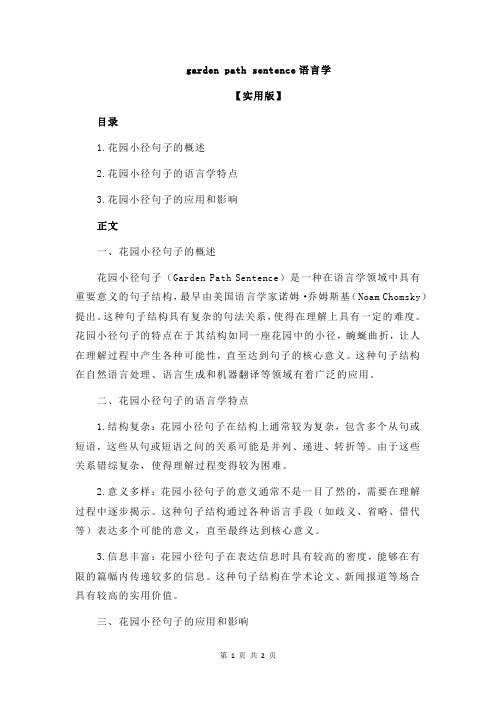
garden path sentence语言学【实用版】目录1.花园小径句子的概述2.花园小径句子的语言学特点3.花园小径句子的应用和影响正文一、花园小径句子的概述花园小径句子(Garden Path Sentence)是一种在语言学领域中具有重要意义的句子结构,最早由美国语言学家诺姆·乔姆斯基(Noam Chomsky)提出。
这种句子结构具有复杂的句法关系,使得在理解上具有一定的难度。
花园小径句子的特点在于其结构如同一座花园中的小径,蜿蜒曲折,让人在理解过程中产生各种可能性,直至达到句子的核心意义。
这种句子结构在自然语言处理、语言生成和机器翻译等领域有着广泛的应用。
二、花园小径句子的语言学特点1.结构复杂:花园小径句子在结构上通常较为复杂,包含多个从句或短语,这些从句或短语之间的关系可能是并列、递进、转折等。
由于这些关系错综复杂,使得理解过程变得较为困难。
2.意义多样:花园小径句子的意义通常不是一目了然的,需要在理解过程中逐步揭示。
这种句子结构通过各种语言手段(如歧义、省略、借代等)表达多个可能的意义,直至最终达到核心意义。
3.信息丰富:花园小径句子在表达信息时具有较高的密度,能够在有限的篇幅内传递较多的信息。
这种句子结构在学术论文、新闻报道等场合具有较高的实用价值。
三、花园小径句子的应用和影响花园小径句子在实际应用中具有重要意义,特别是在文学创作、新闻报道等领域。
通过使用这种句子结构,作者可以创造出更为丰富、复杂的意义,增强文章的表达效果和可读性。
在语言学研究领域,花园小径句子作为一种重要的语言现象,对自然语言处理、语言生成和机器翻译等领域的发展产生了深远的影响。
例如,在机器翻译领域,研究者需要通过对花园小径句子的深入分析,提高翻译模型对复杂句子结构的处理能力,从而提高翻译质量。
总之,花园小径句子作为一种具有复杂结构的语言现象,对语言学研究和实际应用具有重要意义。
在花园里的英语
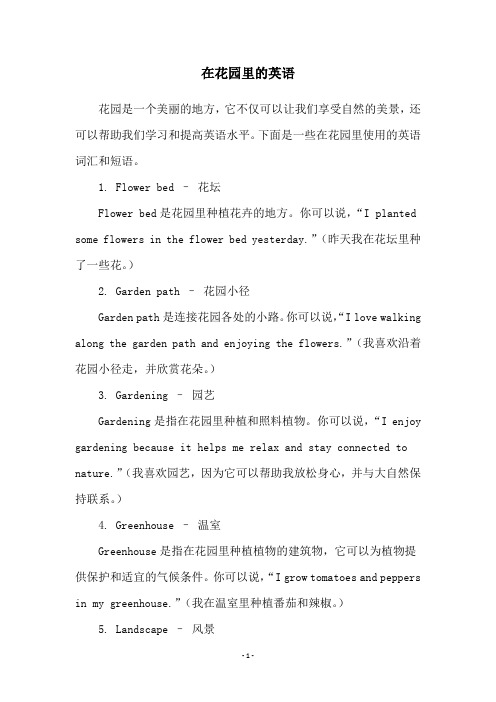
在花园里的英语花园是一个美丽的地方,它不仅可以让我们享受自然的美景,还可以帮助我们学习和提高英语水平。
下面是一些在花园里使用的英语词汇和短语。
1. Flower bed –花坛Flower bed是花园里种植花卉的地方。
你可以说,“I planted some flowers in the flower bed yesterday.”(昨天我在花坛里种了一些花。
)2. Garden path –花园小径Garden path是连接花园各处的小路。
你可以说,“I love walking along the garden path and enjoying the flowers.”(我喜欢沿着花园小径走,并欣赏花朵。
)3. Gardening –园艺Gardening是指在花园里种植和照料植物。
你可以说,“I enjoy gardening because it helps me relax and stay connected to nature.”(我喜欢园艺,因为它可以帮助我放松身心,并与大自然保持联系。
)4. Greenhouse –温室Greenhouse是指在花园里种植植物的建筑物,它可以为植物提供保护和适宜的气候条件。
你可以说,“I grow tomatoes and peppers in my greenhouse.”(我在温室里种植番茄和辣椒。
)5. Landscape –风景Landscape是指花园里的景色和环境,包括植物、建筑和水景。
你可以说,“The landscape of my garden is very beautiful in the spring.”(我的花园春天的景色非常美丽。
)6. Prune –剪枝Prune是指在花园里修剪和修整植物的枝条和叶子。
你可以说,“I need to prune my roses before the winter comes.”(在冬天来临之前,我需要修剪我的玫瑰花。
garden path sentence语言学

garden path sentence语言学摘要:1.引言:花园小径句的定义和例子2.花园小径句的成因及其在语言学中的重要性3.花园小径句的分类及特点4.应对花园小径句的策略5.结论:花园小径句对语言学习者的启示正文:花园小径句(Garden Path Sentence)是指一种特殊的句子结构,它在一定程度上违反了语法规则,使得听话者在理解过程中需要经历一个从错误解读到正确解读的转变。
这种现象在语言学领域具有很高的研究价值,因为它揭示了人类语言处理过程中的认知机制。
花园小径句的成因主要与语言的多样性和复杂性有关。
在英语中,一词多义和语法规则的灵活性使得句子结构可能出现歧义。
例如,句子“I am going to go and do some shopping”中的“going to”就可以理解为“打算去”,也可以理解为“正在去”。
这种歧义性使得听话者在理解句子时需要根据语境和常识进行判断。
根据句子的结构和意义,花园小径句可以分为两类:一是歧义句,如上述的“I am going to go and do some shopping”;二是局部歧义句,如“She loved the cake so much that she offered me a piece”。
对于这类句子,听话者需要在理解过程中对句子进行重新解析,以找到正确的解读。
在面对花园小径句时,有以下几点策略可以帮助我们更好地理解:1.充分了解语境。
理解花园小径句的关键在于把握语境,通过语境来判断句子的真实含义。
2.熟悉一词多义现象。
在英语中,很多单词具有多个含义,这可能导致句子理解出现偏差。
因此,掌握词汇的多种意义对于解决花园小径句非常重要。
3.了解句子结构。
分析句子的成分和关系,有助于找出句子中的歧义点,从而正确理解整个句子。
4.培养跨文化交际能力。
不同文化背景下的语言表达和理解方式存在差异,掌握这些差异有助于避免花园小径句理解错误。
garden path sentence语言学
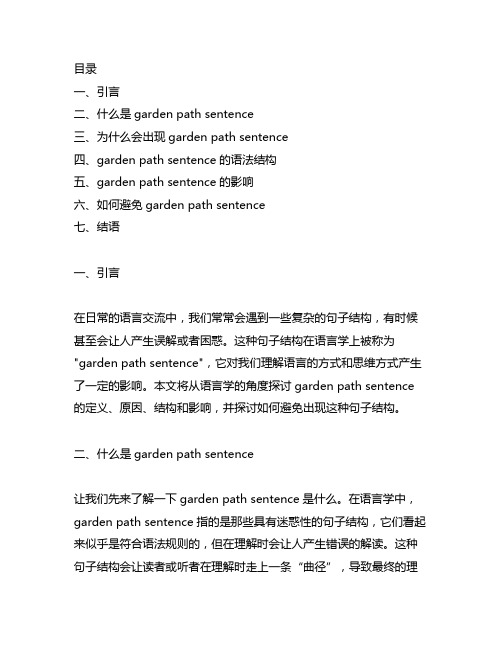
目录一、引言二、什么是garden path sentence三、为什么会出现garden path sentence四、garden path sentence的语法结构五、garden path sentence的影响六、如何避免garden path sentence七、结语一、引言在日常的语言交流中,我们常常会遇到一些复杂的句子结构,有时候甚至会让人产生误解或者困惑。
这种句子结构在语言学上被称为"garden path sentence",它对我们理解语言的方式和思维方式产生了一定的影响。
本文将从语言学的角度探讨garden path sentence 的定义、原因、结构和影响,并探讨如何避免出现这种句子结构。
二、什么是garden path sentence让我们先来了解一下garden path sentence是什么。
在语言学中,garden path sentence指的是那些具有迷惑性的句子结构,它们看起来似乎是符合语法规则的,但在理解时会让人产生错误的解读。
这种句子结构会让读者或听者在理解时走上一条“曲径”,导致最终的理解与原意不符。
举个例子,"The old man the boats"就是一个经典的garden path sentence。
在这个句子中,由于"old man"和"the boats"之间没有明显的语法指示词,"man"和"the boats"之间的关系不是很清晰,容易让人误解。
这种句子结构会让我们在理解时走上一个看似正确但实际上是错误的路线,从而产生误解。
三、为什么会出现garden path sentence那么,为什么会出现garden path sentence呢?这主要是因为语言的歧义性和多义性导致的。
在语言中,很多词语有多种含义,而同一个词语在不同的语境中可能会有不同的解释。
garden path sentence语言学

Garden Path Sentence语言学1. 引言Garden Path Sentence(花园小径句)是语言学中一个有趣且具有挑战性的概念。
这种句子看似简单,但在阅读过程中可能会导致读者产生误解或困惑。
本文将介绍Garden Path Sentence的定义、特点以及一些常见的例子。
同时,我们还将讨论其对语言理解和处理的影响。
2. 定义Garden Path Sentence是指那些在开始阅读时会引导读者走向错误理解的句子。
这种句子通常具有模糊、歧义或不寻常的结构,使得读者在理解过程中产生困惑。
3. 特点Garden Path Sentence具有以下几个特点:3.1 模糊性这类句子通常包含多个可能的解释,使得读者很难在一开始就准确地理解其意思。
这种模糊性是由于词汇、语法或结构上的歧义造成的。
3.2 误导性Garden Path Sentence通过使用误导性的词语或结构来引导读者进入错误的思维路径。
这种误导可能会导致读者需要回头重新解释句子,以便更好地理解其意义。
3.3 阅读困难由于Garden Path Sentence的结构不寻常,读者在阅读过程中可能会感到困惑或无法理解。
这种困难要求读者重新解析句子,以便正确地理解其含义。
4. 示例下面是一些常见的Garden Path Sentence示例:4.1 “The old man the boats.”这个句子可以被误解为“老人驾驶船只”。
然而,正确的解释应该是“老人看着船只”。
4.2 “The horse raced past the barn fell.”这个句子在开始时可能会被误解为“赛马从谷仓旁边跑过。
”然而,正确的解释应该是“在谷仓旁边跌倒的马”。
4.3 “The complex houses married and single soldiers and their families.”这个句子开始时可能会被误解为“复杂的房子里住着已婚和单身士兵及其家人”。
探究英语中“花园小径”现象

探究英语中“花园小径”现象作者:马志娟来源:《科教导刊·电子版》2013年第11期摘要“花园小径”现象作为语言处理中的特殊语言歧义,在整体上并不存在歧义,只有一种正确解读,因此本文倾向于将其定义为认知主体在信息处理过程中的一种误读。
本文从句法、语义与语用三个方面来实例分析英语中的“花园小径”现象以便排除“花园小径”句中的歧义。
关键词“花园小径”现象暂时性歧义归因分析中图分类号:H314.3 文献标识码:A歧义作为语言中的经常性问题,是一个词语或语句在使用中产生了两种及其以上的含义,造成意义上的模糊不清。
从心理学角度来看,在语言理解过程中存在着两种典型歧义(刘国辉,石锡书,2005):一类是永久性歧义,如 Mary saw the man with binoculars through the telescope.另一类是暂时性歧义,研究者形象地称之为“花园小径”现象(Garden Path phenomenon,简称GP),如 The girl told the story cried.蒋祖康(2000)将此种语言现象描述为“就像在花园中走错了路,折回头再寻路径”。
1“花园小径”现状研究“花园小径”现象是语言处理过程中出现的一种特殊的语言歧义现象,多数研究者认为是“局部歧义”(蒋祖康,2000),也有部分研究者认为是“非局部歧义”(杜家利,2006)。
由于“花园小径”句在整体上并不存在歧义,只有一种正确解读,因此本文倾向于将“花园小径”现象定义为认知主体在信息处理过程中的一种误读。
自20世纪70年代以来,英语中“花园小径”现象引起了心理语言学家及语法学家的广泛关注。
早期的学者,如Bever(1970),Kimball(1973)主要从认知和心理语言学的角度进行探讨。
20世纪80年代起,Pritchett,Weinberg Frazier 和Clifton, Sturt 和Crocker(蒋祖康,2000)等学者多将语法分析与功能结构解析相结合,从语法角度成功地解决了心理语言学难以破解的问题。
花园幽径句初探-COLIPS
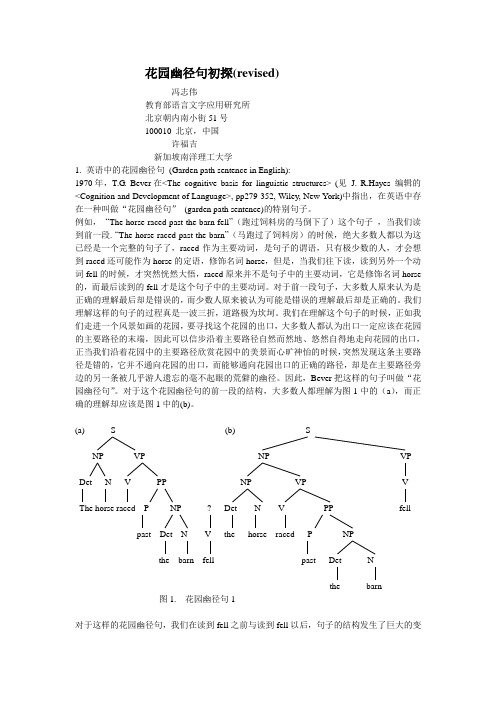
花园幽径句初探(revised)冯志伟教育部语言文字应用研究所北京朝内南小街51号100010 北京,中国许福吉新加坡南洋理工大学1. 英语中的花园幽径句(Garden path sentence in English):1970年,T.G. Bever在<The cognitive basis for linguistic structures> (见J. R.Hayes 编辑的<Cognition and Development of Language>, pp279-352, Wiley, New York)中指出,在英语中存在一种叫做“花园幽径句”(garden path sentence)的特别句子。
例如,“The horse raced past the barn fell”(跑过饲料房的马倒下了)这个句子,当我们读到前一段. “The horse raced past the barn”(马跑过了饲料房)的时候,绝大多数人都以为这已经是一个完整的句子了,raced作为主要动词,是句子的谓语,只有极少数的人,才会想到raced还可能作为horse的定语,修饰名词horse,但是,当我们往下读,读到另外一个动词fell的时候,才突然恍然大悟,raced原来并不是句子中的主要动词,它是修饰名词horse 的,而最后读到的fell才是这个句子中的主要动词。
对于前一段句子,大多数人原来认为是正确的理解最后却是错误的,而少数人原来被认为可能是错误的理解最后却是正确的。
我们理解这样的句子的过程真是一波三折,道路极为坎坷。
我们在理解这个句子的时候,正如我们走进一个风景如画的花园,要寻找这个花园的出口,大多数人都认为出口一定应该在花园的主要路径的末端,因此可以信步沿着主要路径自然而然地、悠然自得地走向花园的出口,正当我们沿着花园中的主要路径欣赏花园中的美景而心旷神怡的时候,突然发现这条主要路径是错的,它并不通向花园的出口,而能够通向花园出口的正确的路径,却是在主要路径旁边的另一条被几乎游人遗忘的毫不起眼的荒僻的幽径。
[重要] garden path 例句
![[重要] garden path 例句](https://img.taocdn.com/s3/m/d8040b05657d27284b73f242336c1eb91a3733eb.png)
Garden Path SentencesBelow are some‘garden path’sentences.They are alike in that,when one reads them,one frequently experiences some confusion and has to restart the parse;the metaphor is‘being led down the garden path’.This can happen in several ways.1.The prime number few.2.Fat people eat accumulates.3. The cotton clothing is usually made of grows in Mississippi.4.Until the police arrest the drug dealers control the street.5.The man who hunts ducks out on weekends.6.When Fred eats food gets thrown.7.Mary gave the child the dog bit a bandaid.8. The girl told the story cried.9.I convinced her children are noisy.10.Helen is expecting tomorrow to be a bad day.11.The horse raced past the barn fell.12.I know the words to that song about the queen don't rhyme.13.She told me a little white lie will come back to haunt me.14.The dog that I had really loved bones.15.That Jill is never here hurts.16.The man who whistles tunes pianos.17.The old man the boat.18.Have the students who failed the exam take the supplementary.19.The raft floated down the river sank.20.We painted the wall with cracks.21.The tycoon sold the offshore oil tracts for a lot of money wanted to kill JR. For each sentence,describe the problem and the structures that contribute to it. Do the sentences fall into classes based on structural characteristics?Be sure to notice in each case whether the garden-path phenomenon is restricted to reading,or whether it is also present when the sentence is spoken aloud.I.e,how much of this phenomenon is automatically disambiguated by intonation, stress,and rhythm in ordinary speech?。
曲师大语言学考试术语解释
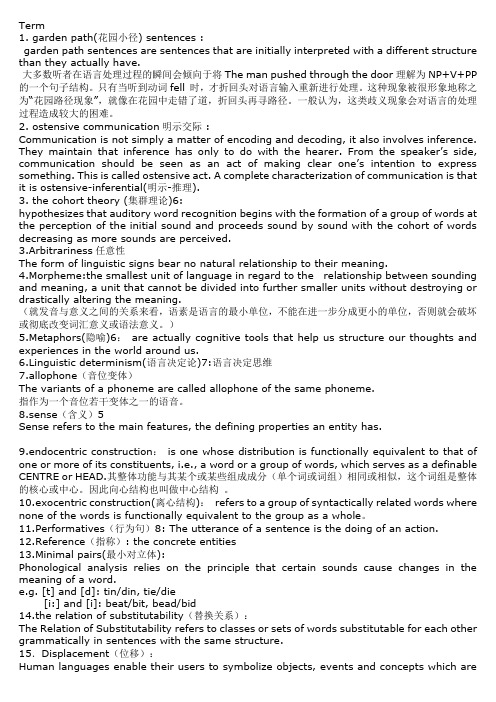
Term1. garden path(花园小径) sentences :garden path sentences are sentences that are initially interpreted with a different structure than they actually have.大多数听者在语言处理过程的瞬间会倾向于将The man pushed through the door理解为NP+V+PP 的一个句子结构。
只有当听到动词fell 时,才折回头对语言输入重新进行处理。
这种现象被很形象地称之为“花园路径现象”,就像在花园中走错了道,折回头再寻路径。
一般认为,这类歧义现象会对语言的处理过程造成较大的困难。
2. ostensive communication明示交际 :Communication is not simply a matter of encoding and decoding, it also involves inference. They maintain that inference has only to do with the hearer. From the speaker’s side, communication should be seen as an act of making clear one’s intention to express something. This is called ostensive act. A complete characterization of communication is that it is ostensive-inferential(明示-推理).3. the cohort theory (集群理论)6:hypothesizes that auditory word recognition begins with the formation of a group of words at the perception of the initial sound and proceeds sound by sound with the cohort of words decreasing as more sounds are perceived.3.Arbitrariness任意性The form of linguistic signs bear no natural relationship to their meaning.4.Morpheme:the smallest unit of language in regard to the relationship between sounding and meaning, a unit that cannot be divided into further smaller units without destroying or drastically altering the meaning.(就发音与意义之间的关系来看,语素是语言的最小单位,不能在进一步分成更小的单位,否则就会破坏或彻底改变词汇意义或语法意义。
garden path sentence语言学
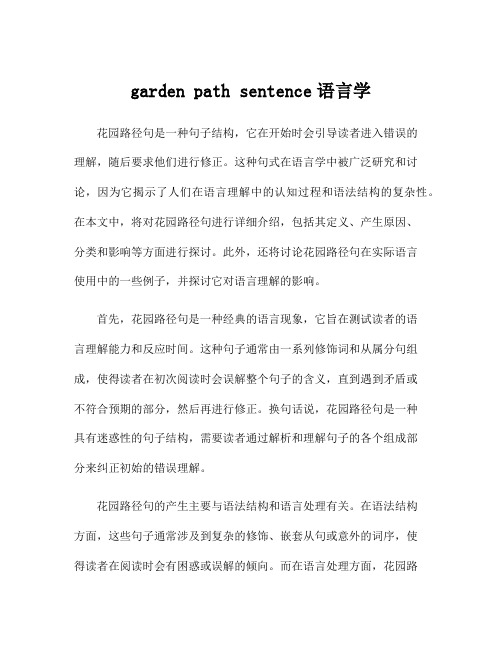
garden path sentence语言学花园路径句是一种句子结构,它在开始时会引导读者进入错误的理解,随后要求他们进行修正。
这种句式在语言学中被广泛研究和讨论,因为它揭示了人们在语言理解中的认知过程和语法结构的复杂性。
在本文中,将对花园路径句进行详细介绍,包括其定义、产生原因、分类和影响等方面进行探讨。
此外,还将讨论花园路径句在实际语言使用中的一些例子,并探讨它对语言理解的影响。
首先,花园路径句是一种经典的语言现象,它旨在测试读者的语言理解能力和反应时间。
这种句子通常由一系列修饰词和从属分句组成,使得读者在初次阅读时会误解整个句子的含义,直到遇到矛盾或不符合预期的部分,然后再进行修正。
换句话说,花园路径句是一种具有迷惑性的句子结构,需要读者通过解析和理解句子的各个组成部分来纠正初始的错误理解。
花园路径句的产生主要与语法结构和语言处理有关。
在语法结构方面,这些句子通常涉及到复杂的修饰、嵌套从句或意外的词序,使得读者在阅读时会有困惑或误解的倾向。
而在语言处理方面,花园路径句要求读者从句子的表面结构中推测出其真正的含义,并在遇到不一致的信息时进行修正。
这种修正过程涉及到大脑的语言处理和推理能力,因此也吸引了很多认知科学家和心理学家的研究兴趣。
花园路径句可以被分为不同的类型,根据其产生错误理解的方式和修正方式。
其中最常见的类型是歧义句,它们通过词语、短语或句子的歧义性来引导读者的错误理解。
例如,“时间过得飞快”这句话在最初读到时,会让人误解为时间是以一种飞快的方式过去的,而实际上该句的意思是时间过得很快。
另一种类型是陈述句变问句,这些句子在结构上与陈述句相似,但读者需要注意到其中一个关键词的变化,才能理解其实际意义。
例如,“郭敬明也没有女朋友吧?”这句话在最初读到时,会误导读者认为郭敬明有女朋友,但实际上该句的意思是否定的。
花园路径句对语言理解和认知过程有重要影响。
首先,它揭示了人们在语言理解中的认知困境和处理复杂结构的能力。
英汉语中的“花园路径现象”

英汉语中的“花园路径现象”徐艳红【摘要】"Garden path phenomenon" is a kind of ges, which is interpreted as a phenomenon of partial special phenomenon in the ambiguity by linguists and process ot parsing langua- psychologists. There exist lots of such phenomena in English and Chinese, and the process of interpreting such ambiguous structures resembles searching for paths in gardens in that listeners have to make choices between alternative mean- ings by reanalyzing different ambiguous results. "Garden path phenomenon "is a complicate linguistic phenomenon ; thus, we can interpret such a phenomenon from syhtactic, semantic and pragmatic aspects.%“花园路径现象”是语言处理过程中的一种特殊现象,语言学家和心理学家们将其解释为局部歧义现象。
英语和汉语中都存在这种现象,听话者在理解过程中,如同在花园中寻路,经过重新分析不同的歧义结果选择合理的解释。
“花园路径现象”是一种复杂的语言现象,可以从句法、语义和语用等方面对其进行理解。
【期刊名称】《西南科技大学学报(哲学社会科学版)》【年(卷),期】2012(029)006【总页数】5页(P74-78)【关键词】花园路径现象;句法;语义;语用【作者】徐艳红【作者单位】湖南商学院外国语学院,湖南长沙410205【正文语种】中文【中图分类】H030一、引言花园路径现象是因语言的输入顺序导致句子组成成分之间的语法关系不确定而暂时引起歧义的一种特殊语言现象。
garden path sentence语言学

Garden Path SentenceIntroductionGarden Path Sentence is a linguistic phenomenon that involves sentences that initially appear to have a straightforward structure but lead the reader or listener astray, forcing them to reinterpret the sentence in order to understand its true meaning. These sentences challenge our understanding of grammar and syntax, highlighting the complexities of language processing.In this article, we will explore the concept of garden path sentences, their characteristics, and their significance in linguistics. We will also discuss some famous examples and delve into the cognitive processes involved in deciphering these sentences.Characteristics of Garden Path SentencesGarden path sentences are known for their ability to mislead readers or listeners due to their ambiguous or misleading structure. They often contain words or phrases that can be interpreted in multiple ways, leading individuals down an incorrect syntactic path before realizing the intended meaning.Here are some key characteristics of garden path sentences:1.Initial Misinterpretation: The sentence begins with a structurethat initially seems grammatically correct but later turns out to be incorrect.2.Syntactic Ambiguity: The sentence contains words or phrases thatcan be parsed differently, leading to multiple possibleinterpretations.3.Reanalysis: Upon realizing the misinterpretation, the reader orlistener must reanalyze and reinterpret the sentence to understand its intended meaning.4.Processing Difficulty: Garden path sentences create processingdifficulties as they require more cognitive effort to decode dueto their misleading structure.Examples of Garden Path SentencesLet’s explore some famous examples of garden path sentences:1.“The old man the boat.”This sentence initially suggests that an old man is performing anaction on a boat. However, upon reanalysis, we realize that “old”is an adjective describing “man,” and “the boat” is actuallythe direct object of the sentence.2.“The horse raced past the barn fell.”This sentence leads us to believe that the horse raced past thebarn, but upon further analysis, we understand that “raced” is averb and “past the barn” is a prepositional phrase modifying“the horse.” Therefore, the sentence means that the horse thatwas raced fell.3.“The complex houses married and single soldiers and theirfamilies.”Initially, this sentence seems to suggest that the complex housesboth married soldiers and single soldiers along with theirfamilies. However, upon reevaluation, we understand that “complex”is a noun meaning a housing complex or building.Cognitive Processes InvolvedGarden path sentences challenge our cognitive processes as we navigate through their misleading structure. Understanding these sentencesrequires us to engage in several cognitive processes:1.Parsing: Parsing involves breaking down a sentence into itsgrammatical components. Garden path sentences disrupt this processby presenting ambiguous or misleading structures.2.Working Memory: Decoding garden path sentences requires holdingmultiple interpretations in working memory until the correctinterpretation is determined.3.Reanalysis: When faced with a misinterpretation, reanalysisinvolves revisiting and reevaluating previous assumptions toarrive at the intended meaning.4.Top-down Processing: Top-down processing involves utilizingcontext and prior knowledge to aid in sentence comprehension.Garden path sentences challenge top-down processing as they candeceive even individuals with extensive language knowledge.Significance in LinguisticsGarden path sentences have significant implications for linguistic research and our understanding of language processing:1.Syntax and Grammar: Garden path sentences reveal the intricaciesof syntax and grammar by highlighting potential pitfalls inparsing and interpreting sentences.nguage Processing: The study of garden path sentences providesinsights into how humans process language, including parsingstrategies, cognitive load management, and reanalysis mechanisms. putational Linguistics: Understanding garden path sentencesaids in developing computational models for natural languageprocessing tasks, such as machine translation and speechrecognition.ConclusionGarden path sentences serve as intriguing linguistic puzzles that challenge our understanding of grammar and language processing. By presenting misleading structures, these sentences force us to reevaluate our initial interpretations and engage in complex cognitive processes.Understanding garden path sentences contributes to our knowledge of syntax, grammar, and language comprehension. Moreover, their study has practical applications in computational linguistics. As we continue to explore the complexities of language, garden path sentences will remain an intriguing area of research for linguists and cognitive scientists alike.。
英语中的花园路径句及其解读

英语中的花园路径句及其解读曾淑萍【摘要】英语中存在一类特殊而有趣的句子——花园路径句.读者们常常不由自主地沿着错误的方向解读这类句子,直至出现语义短路,他们才按非常规方式重新去解读.本文拟从词汇、句法、语用三个层面分析英语花园路径句形成的原因,并结合实例探讨这类句子的正确解读方法.希望有助于增强英语学习者对花园路径句的敏感性,注重词汇积累,熟练掌握句法结构,从而正确解读花园路径句.【期刊名称】《齐齐哈尔大学学报(哲学社会科学版)》【年(卷),期】2016(000)004【总页数】3页(P139-140,143)【关键词】花园路径句;词汇;句法;语用;解读【作者】曾淑萍【作者单位】福州外语外贸学院英语系,福建福州350202【正文语种】中文【中图分类】H314花园路径句(garden-path sentence简称GP sentence)是20世纪70年代初期由心理语言学家T. G. Bever在The Cognitive Basis for Linguistic Structures 一文中提出的。
它是一种特殊而又复杂的局部歧义现象:人们在理解句子时,按常规方式会产生某种理解,直到句末出现新的信息时,才发现这种理解有误,于是回过头去对输入的语言重新进行处理,最后得到实际的语义,达到理解的目的。
[1]花园路径句给许多英语学习者造成了语言理解上的困难,归纳起来主要源于三个方面:词汇、句法和语用。
英语中不少单词同时具有不同词性且一词多义的现象比较普遍。
人们对句子中主要词汇的理解,往往都是选择其最常用的词性和词义,对较不常用的词性和词义则本能地过滤,而当实际词性和词义与最常用的词性和词义相悖时,人们对句子的理解就会出现“语义短路”,而不得不中途折返。
例 1 Fat people eat accumulates.看到这个句子,大多数人会把“fat”看作是形容词,在句中修饰people,意为“肥胖的人”,即人们潜意识地选择了“fat”的最常用词性以及最常用的义项,但是当人们往后读时,就会发现整个句子的意思无法理解,于是不得不重新分析句子。
2023年高考英语外刊时文精读专题09盘中知世界:花园卸
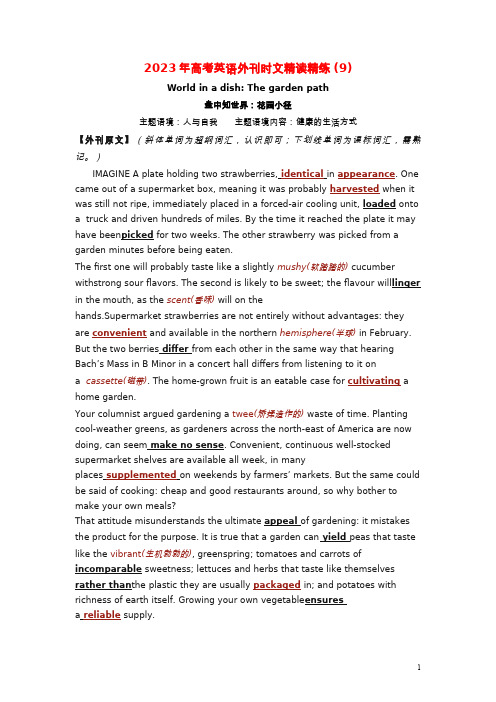
2023年高考英语外刊时文精读精练 (9)World in a dish: The garden path盘中知世界:花园小径主题语境:人与自我 主题语境内容:健康的生活方式【外刊原文】(斜体单词为超纲词汇,认识即可;下划线单词为课标词汇,需熟记。
)IMAGINE A plate holding two strawberries, identical in appearance. One came out of a supermarket box, meaning it was probably harvested when it was still not ripe, immediately placed in a forced-air cooling unit, loaded onto a truck and driven hundreds of miles. By the time it reached the plate it may have been picked for two weeks. The other strawberry was picked from a garden minutes before being eaten.The first one will probably taste like a slightly mushy(软踏踏的) cucumber withstrong sour flavors. The second is likely to be sweet; the flavour will linger in the mouth, as the scent(香味) will on thehands.Supermarket strawberries are not entirely without advantages: they are convenient and available in the northern hemisphere(半球) in February. But the two berries differ from each other in the same way that hearing Bach’s Mass in B Minor in a concert hall differs from listening to it ona cassette(磁带). The home-grown fruit is an eatable case for cultivating a home garden.Your columnist argued gardening a twee(矫揉造作的) waste of time. Planting cool-weather greens, as gardeners across the north-east of America are now doing, can seem make no sense. Convenient, continuous well-stocked supermarket shelves are available all week, in manyplaces supplemented on weekends by farmers’ markets. But the same could be said of cooking: cheap and good restaurants around, so why bother to make your own meals?That attitude misunderstands the ultimate appeal of gardening: it mistakes the product for the purpose. It is true that a garden can yield peas that taste like the vibrant(生机勃勃的), greenspring; tomatoes and carrots of incomparable sweetness; lettuces and herbs that taste like themselves rather than the plastic they are usually packaged in; and potatoes with richness of earth itself. Growing your own vegetable ensuresa reliable supply.On the other hand ,a garden, especially in the early years, can also yield little but frustration. Beginners may plant the wrong crops for their soil. Squirrels have a habit of taking single bites of cucumbers, beans and tomatoes, then leaving the rest on the vine to rot(腐烂). And even expert gardeners can lose a season’s harvest to un co operative weather.No matter. The real joy of gardening is the time spent doing it. Thedeepest pleasure—as with cooking, writing, bringing up children or almost anything worthwhile—is in the work itself. Agardener’s memories revolve not around the food produced, but around long summer afternoons with hands in the dirt, surrounded by family, if the garden is at home, or deepening acquaintances with friends and neighbours in acommunity garden. To garden is to patiently, lovinglyand diligently help life flourish, in the ground and above it.【课标词汇】1.identical完全相同的;极为相似的I've got three identical blue suits.我有三套完全相同的蓝色西装。
- 1、下载文档前请自行甄别文档内容的完整性,平台不提供额外的编辑、内容补充、找答案等附加服务。
- 2、"仅部分预览"的文档,不可在线预览部分如存在完整性等问题,可反馈申请退款(可完整预览的文档不适用该条件!)。
- 3、如文档侵犯您的权益,请联系客服反馈,我们会尽快为您处理(人工客服工作时间:9:00-18:30)。
Garden Path Sentences
Below are some ‘garden path’ sentences. They are alike in that, when one reads
them, one frequently experiences some confusion and has to restart the parse; the metaphor is ‘being led down the garden path’. This can happen in several ways.
1.The prime number few.
2.Fat people eat accumulates.
3.The cotton clothing is usually made of grows in Mississippi.
4.Until the police arrest the drug dealers control the street.
5.The man who hunts ducks out on weekends.
6.When Fred eats food gets thrown.
7.Mary gave the child the dog bit a bandaid.
8.The girl told the story cried.
9.I convinced her children are noisy.
10.Helen is expecting tomorrow to be a bad day.
11.The horse raced past the barn fell.
12.I know the words to that song about the queen don't rhyme.
13.She told me a little white lie will come back to haunt me.
14.The dog that I had really loved bones.
15.That Jill is never here hurts.
16.The man who whistles tunes pianos.
17.The old man the boat.
18.Have the students who failed the exam take the supplementary.
19.The raft floated down the river sank.
20.We painted the wall with cracks.
21.The tycoon sold the offshore oil tracts for a lot of money wanted to kill JR. For each sentence, describe the problem and the structures that contribute to it.
Do the sentences fall into classes based on structural characteristics?
Be sure to notice in each case whether the garden-path phenomenon is restricted to reading, or whether it is also present when the sentence is spoken aloud.
I.e, how much of this phenomenon is automatically disambiguated by intonation, stress, and rhythm in ordinary speech?。
